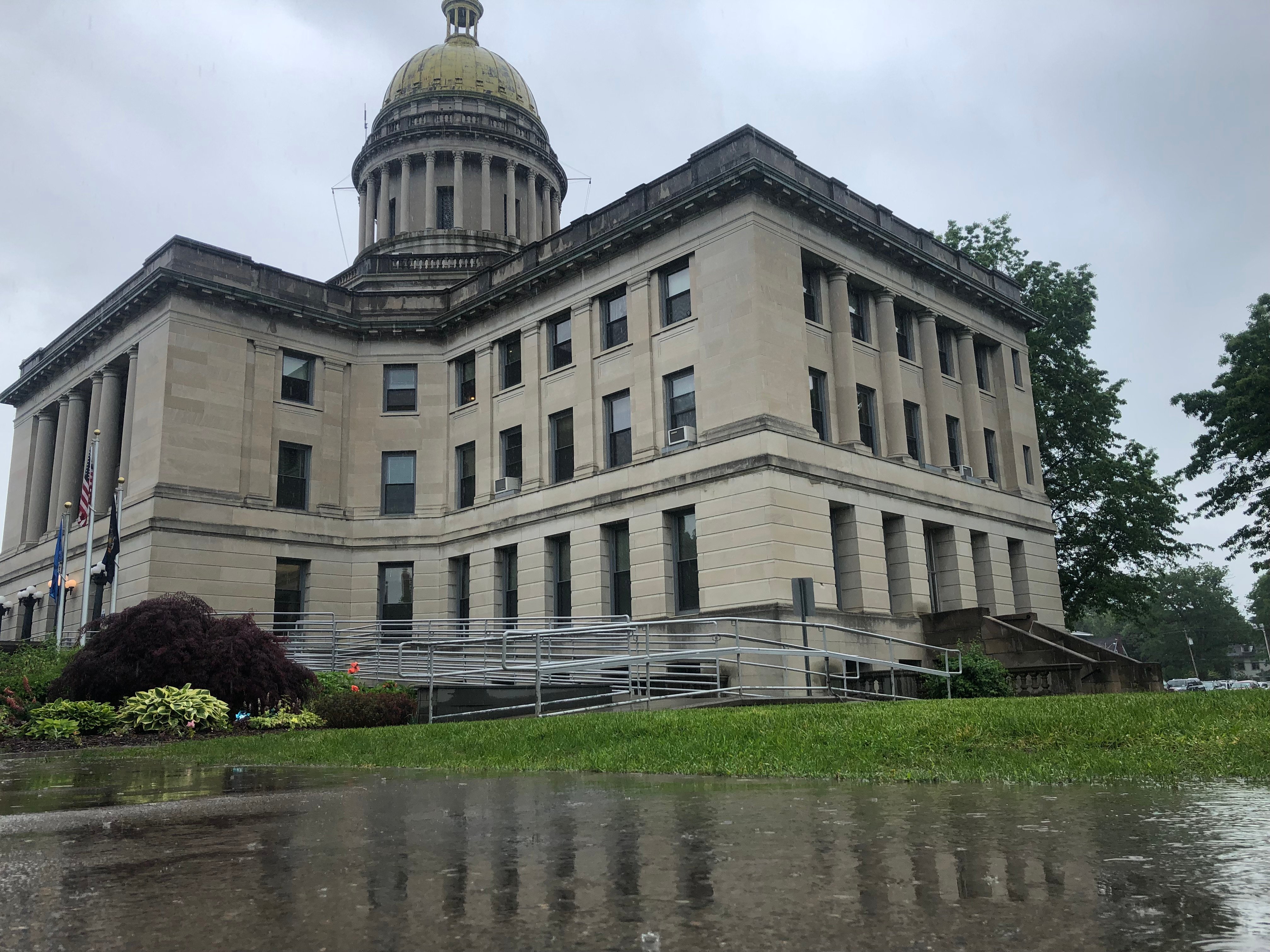
Cortland Deputy Fire Chief Bill Knickerbocker outside the Cortland Fire Department headquarters Wednesday afternoon. (Sarah Bullock/Cortland Voice)
Hanging outside Fire Chief Charles Glover’s office is a faded poster that reads, “There is no honor in fighting a fire that could have been prevented through education.”
When Glover looks back over the last four decades of fire fighting in the city, he sees the impact of what education and code enforcement has done for Cortland in the steady decrease of fires since 1994. And it’s no coincidence in Glover’s mind that was the year Deputy Fire Chief Bill Knickerbocker was hired.
Knickerbocker retired Thursday after 25 years as a firefighter and code enforcement officer for the City of Cortland.
“If I looked at my 42 years of fire service here in Cortland, I see what I believe were the direct results of a proactive code enforcement system,” Knickerbocker said. “I think it’s probably been one of the reasons there has been a reduction of fire in the city of Cortland, as well as compliance with codes and standards that had previously gone unchecked.”
Glover recalled how when he was first hired in the 1980s, the code enforcement office was understaffed, undereducated and underfunded -- leading to dangerous conditions for firefighters when they entered city buildings and more frequent fires.
“We were going into buildings and the enforcement just wasn’t there,” Glover said. “They were doing the best with what they had to work with, they just didn’t have the right tools.”
That all changed when the Code Enforcement Office became part of the Fire Department. Glover originally headed the new office and hired Knickerbocker in 1994; Knickerbocker, who previously worked in Building and Planning for Chenango County, was promoted to office director in 2000.
“I think we’ve changed from being reactive to proactive,” Glover said, noting that proper code adherence and enforcement prevents fires and saves lives. “Codes aren’t just something the government does to annoy the populace. Codes are written in the blood of victims.”
Knickerbocker said on his last day his worry has been that there would be a fire that could have been prevented by complying with city codes, but wasn’t.
“It’s always concerning when the call comes in and you know you could have done something about it,” he said.
It’s that sense of duty and dedication that has kept Knickerbocker on the force when he could have retired at half pay after 20 years, Glover noted.
“I’m sure a lot of why Bill hung out for 25 years is because he felt a sense of responsibility for the position he was in,” Glover said.
Knickerbocker’s wife, and co-worker in the codes office for 15 years, agrees.
“He’s an extremely hard worker. It’s everything to him,” Shelly Knickerbocker said. “He’s going to have a hard time separating himself from it because he’s dedicated and he’s very good at what he does.”
Glover and Shelly Knickerbocker both noted Bill Knickerbocker’s expertise in the code enforcement field.
“He’s also on the state committee for codes,” Shelly Knickerbocker said, adding he used to be a state fire code enforcement instructor and others still seek his advice about code enforcement. “People call him from all over, so it’s definitely going to be a loss.”
Knickerbocker noted that over the years, building codes have become increasingly specific as people learn new ways to prevent fires and other tragedies from reoccurring.
One of the treasured possessions Knickerbocker carried with him as he left the station Thursday was his old codes book from when he started.
“The pages are all worn,” he said, holding the book with a sheepish smile. “The pages are all busted up.”
One of the ways Knickerbocker used his expertise for the city was in his ability to review new construction plans - a resource some municipalities have to contract with an engineering firm to provide.
“That’s where I think we’ll miss him the most,” Glover said, “his ability to do plan reviews and not have to go to an outside source.”
Glover will also miss the support of the Knickerbocker’s expertise as a fire department deputy chief.
“As a chief firefighter, I’ll lose the expertise of a command officer,” Glover said. “Gaining that kind of experience is hard in a small department.”
Before joining the city fire department, Knickerbocker was a volunteer Fire Chief for the South Otselic Fire Department, Shelly Knickerbocker noted.
“So to become a career firefighter was a huge opportunity for him,” she said. “And because they had an opening in code enforcement, he was just the perfect fit.”
Knickerbocker was also a perfect fit because his personable nature allowed him to create relationships with property owners instead of animosity, Glover noted.
“That’s how he gained his rapport,” he said. “And code enforcement is a tough business.”
As a former member of the codes office, Shelly Knickerbocker agreed.
“Everyone pretty much hates you,” she said. “But he personalizes it and tries to get to know the people. And I think that is how he’s been successful at it.”
Bill Knickerbocker’s deep relationships with community members he met through his work in the codes office was evident Thursday when he said what he would miss most was the people. His list of friends went far included his fellow firefighters, but also contractors, designers and other city officials.
As Knickerbocker readied to leave the Main Street Fire Station for the last time, he felt a sense of completing a successful journey.
Before descending the stairs and walking out the door, Knickerbocker said, “I really feel I made an impact here — at least I hope I made an impact here.”
The firefighters and city police saluting him as he left seemed to think Knickerbocker had.





